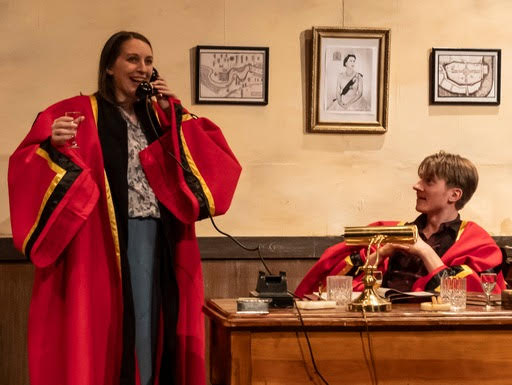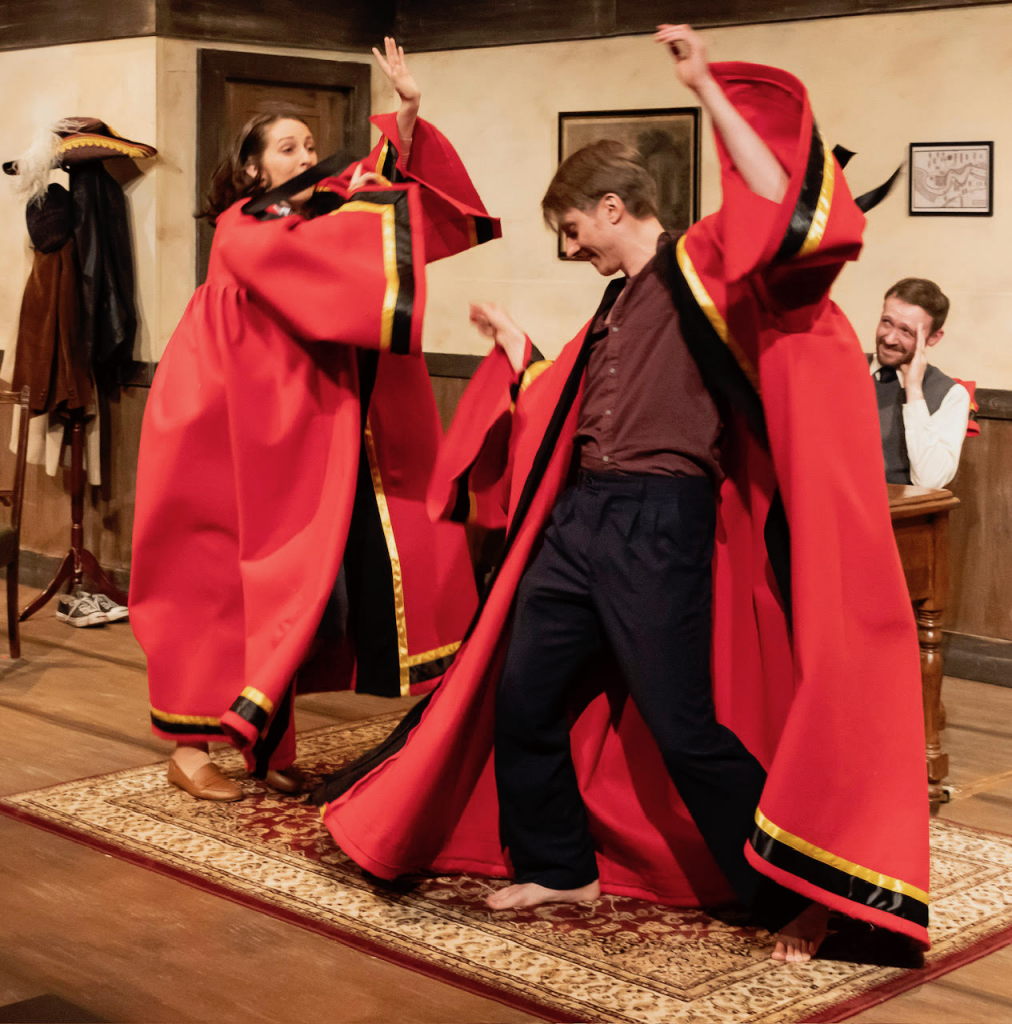
Jericho Arts Centre to May 19, 2024
Tickets from $15 at 604-224-8007 or www.evenbrite.ca
Posted May 7, 2024
Note to aspiring playwrights: If you want to know how it’s done, go and see Brian Friel’s The Freedom of the City at Jericho Arts Centre. Directed by Joan Bryans, artistic director of Vital Spark Theatre, this is a terrific – and terrifying – play written by the late Irish playwright Brian Friel (Dancing at Lughnasa, Translations and others). Under Bryans’ astute direction, the performances are better than solid – in many cases, splendid. And production values with set by R. Todd Parker, lighting design by Jack Mosher and costumes by Jordan Chambers are much higher than one might expect from a largely non-professional company operating on what is likely a shoestring.
Friel sets the play in Derry, Northern Ireland, in two timeframes: Sunday, January 30, 1972 (Bloody Sunday); and later, in April 1972, when the British government concluded an enquiry that exonerated the British troops from any illegal action in the shooting of three Irish civil rights protesters. (Historically, there were 13 killed, one died later and fourteen were wounded. In 2010 a British government inquiry overturned that 1972 ruling and issued an apology; in December 2022 a Northern Ireland court charged one of the soldiers involved in Bloody Sunday with two murders and five attempted murders.)

Credit: Nancy Caldwell
Friel humanizes the events by creating three characters who, when the troops start firing into the crowd of protesters, duck into an open door off the street and away from the tear gas that was being employed. One of them, Michael (Isaac Andrew) has been slightly wounded by a rubber bullet and is helped into the building by Skinner (Liam McCulley); the third is Lily (Geneva Perkins). Strangers to each other, they suddenly find themselves in the Guild Hall in the mayor’s “parlour”. Ironically, the Guild Hall is the symbol of British colonial power, the very thing Michael, Skinner and Lily are protesting against.
These three could hardly be less similar: Lily, 43, is the mother of eleven; Michael, 26, is currently unemployed but has ambitions; Skinner, 24, is full of swagger, also unemployed. What they have in common is poverty.
It’s a bit ‘on the nose’ but during the enquiry in front of the judge (soberly executed by Daryl Hutchings) Friel introduces a sociologist, played by Allyson Riley, who talks about the legacy of poverty – the catalyst for protests and revolution throughout history. Other characters include a firearms expert, a priest who talks a lot of rot about martyrdom, a reporter who was first on the scene and various military figures including the brigadier who ordered the rain of bullets that killed Lily, Michael and Skinner. Thirty four bullets were inflicted on the three protesters. At issue was who fired first: the protesters or the troops. Eye witnesses disagreed on whether Michael, Lily and Skinner were armed.

Credit: Nancy Caldwell
If it all seems grim – and you know from the outset that the three of them are going to die – Friel introduces a lot of levity in the interaction between them while they wait in the Guild Hall. They drink the alcohol in the mayor’s liquor cabinet, they swan about in the mayor and aldermen’s robes of office, Skinner and Lily waltz around while Michael, peering out the window at the assembly of heavily armed British troops, assures them if they give themselves up, they will be safe.
The real heart of this play lies in the characterization of Lily, Michael and Skinner and Bryans has cast these roles so perfectly. Geneva Perkins, as Lily, brings such a housewifely naturalness to Lily. As Lily becomes increasingly tipsy drinking port after port after port, Perkins doesn’t stoop to having Lily stagger about; she just makes her a little giddy and more girlish. And although Skinner is a cocky “fella”, Liam MCulley shows us that Skinner really is a product of unequal opportunity in a culture that keeps the lid on the underclass. Isaac Andrews gives us a Michael that is serious, determined to improve himself and, tragically, believes if he does all the right things, he will get ahead.
The thing that makes The Freedom of the City so engaging is that we come to like, to empathize and to wish good things for Lily, Skinner and Michael. Playwright Friel wraps a very political play in a very human package.
The Freedom of the City is a terrific play and this very fine production illustrates just how much spark there is in Vital Spark Theatre.

